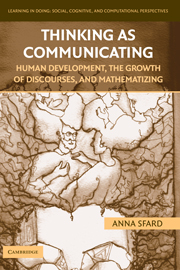Introduction
Published online by Cambridge University Press: 27 July 2009
Summary
If we see knowing not as having an essence, to be described by scientists or philosophers, but rather as a right, by current standards, to believe, then we are well on the way to seeing conversation as the ultimate context within which knowledge is to be understood. Our focus shifts from the relation between human beings and the objects of their inquiry to the relation between alternative standards of justification, and from there to the actual changes in those standards which make up intellectual history.
Richard RortyThis book is a result of years-long attempts to change my own thinking about thinking, a task seemingly as improbable as breaking a hammer by hitting it with itself. In this unlikely undertaking, I have been inspired by Lev Vygotsky, the Byelorussian psychologist who devoted his life to “characterizing the uniquely human aspects of behavior,” and by Ludwig Wittgenstein, the Austrian-British philosopher who insisted that no substantial progress can be made in this kind of endeavor unless the ways we talk, and thus think, about uniquely human “forms of life” undergo extensive revisions.
My admittedly ambitious undertaking had modest beginnings. I was initially interested in learning and teaching mathematics. Like many others before me, I was mystified by what could best be described as vagaries of the human mind: Whereas some people juggled numbers, polygons, and functions effortlessly, some others were petrified at the very mention of numbers or geometric figures.
- Type
- Chapter
- Information
- Thinking as CommunicatingHuman Development, the Growth of Discourses, and Mathematizing, pp. xiii - xxPublisher: Cambridge University PressPrint publication year: 2008



